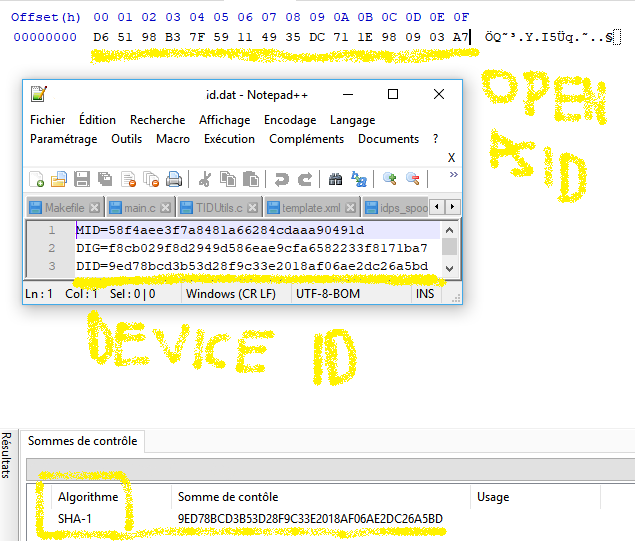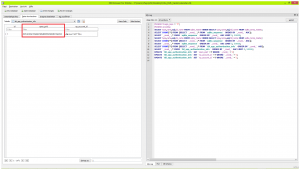DeviceID: Difference between revisions
(Fixed image) |
CelesteBlue (talk | contribs) No edit summary |
||
| Line 3: | Line 3: | ||
== Description == | == Description == | ||
On PS Vita, the Device ID is a unique 20-bytes hexadecimal sequence. It is simply the SHA1 hash of the OpenPSID. It is stored inside several files such as [[id.dat]] or calendar.db in order to check that the inserted memory card was not previously in another PS Vita, else a database refresh is performed. | |||
Why did SCE not simply use | Why did SCE not simply use the OpenPSID? | ||
On PSP, OpenPSID was almost never used except for savedata. | On PSP, OpenPSID was almost never used except for savedata. | ||
| Line 11: | Line 11: | ||
On PS3, OpenPSID was used for act.dat checks, savedata / trophies when no PSN account bounded. | On PS3, OpenPSID was used for act.dat checks, savedata / trophies when no PSN account bounded. | ||
On | On PS Vita, OpenPSID is used the same way as on PS3 but SCE secured still more its console by using the hash of OpenPSID and not OpenPSID itself. | ||
This way, it is harder for people to know their openPSID. But since we have tm0: partition read access with exploits, we can simply read 0x10 Bytes at offset 0x850 of tm0:npdrm/act.dat to get openPSID. | This way, it is harder for people to know their openPSID. But since we have tm0: partition read access with exploits, we can simply read 0x10 Bytes at offset 0x850 of tm0:npdrm/act.dat to get openPSID. | ||
| Line 29: | Line 29: | ||
| id.dat || DID=297C4C0FA1F5A6E374FE4FE65535E03DC1643F2C | | id.dat || DID=297C4C0FA1F5A6E374FE4FE65535E03DC1643F2C | ||
|- | |- | ||
| calendar.db || tbl_app_authentication_info >> column open_psid >> 297C4C0FA1F5A6E374FE4FE65535E03DC1643F2C || The value | | calendar.db || tbl_app_authentication_info >> column open_psid >> 297C4C0FA1F5A6E374FE4FE65535E03DC1643F2C || The value is stored as an ASCII text. | ||
|} | |} | ||
Revision as of 20:21, 25 December 2024
Description
On PS Vita, the Device ID is a unique 20-bytes hexadecimal sequence. It is simply the SHA1 hash of the OpenPSID. It is stored inside several files such as id.dat or calendar.db in order to check that the inserted memory card was not previously in another PS Vita, else a database refresh is performed.
Why did SCE not simply use the OpenPSID?
On PSP, OpenPSID was almost never used except for savedata.
On PS3, OpenPSID was used for act.dat checks, savedata / trophies when no PSN account bounded.
On PS Vita, OpenPSID is used the same way as on PS3 but SCE secured still more its console by using the hash of OpenPSID and not OpenPSID itself.
This way, it is harder for people to know their openPSID. But since we have tm0: partition read access with exploits, we can simply read 0x10 Bytes at offset 0x850 of tm0:npdrm/act.dat to get openPSID.
ux0:id.dat
Location of the files where it is stored
ux0:calendar/calendar.db
| File | Value | Info |
|---|---|---|
| id.dat | DID=297C4C0FA1F5A6E374FE4FE65535E03DC1643F2C | |
| calendar.db | tbl_app_authentication_info >> column open_psid >> 297C4C0FA1F5A6E374FE4FE65535E03DC1643F2C | The value is stored as an ASCII text. |
Structure
| Name | length | Example |
|---|---|---|
| DID | 20 bytes (0x14) | 297C4C0FA1F5A6E374FE4FE65535E03DC1643F2C |

